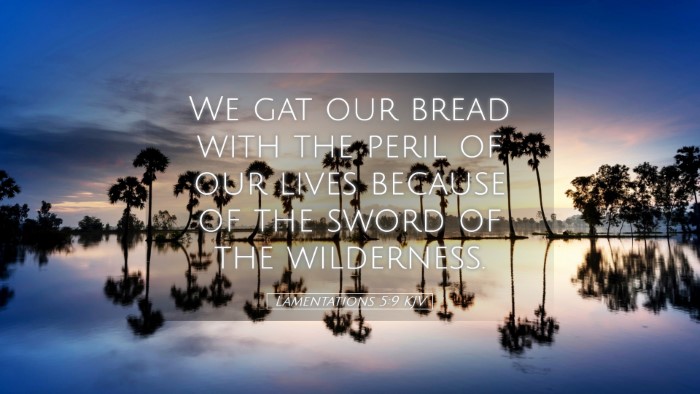Commentary on Lamentations 5:9
Lamentations 5:9 states, "We get our bread at the peril of our lives because of the sword of the wilderness." This verse encapsulates a profound sense of despair and desperation, characteristic of the entire book of Lamentations. Written during a time of national crisis, this passage reflects the physical and spiritual famine experienced by the people of Jerusalem following their city’s destruction.
Analysis and Insights
This verse demonstrates various themes that can be unpacked through the insights of notable public domain commentators such as Matthew Henry, Albert Barnes, and Adam Clarke.
Contextual Background
Before delving into individual analyses, it’s essential to understand the context in which Lamentations was written. After the fall of Jerusalem in 586 B.C., the exiles enduring suffering faced significant challenges, particularly regarding sustenance and safety. The imagery of obtaining bread highlights both the physical necessities for life and the dire circumstances under which these necessities are sought.
Matthew Henry's Perspective
Matthew Henry emphasizes the extreme desperation in the pursuit of daily sustenance. He notes that:
- Desperation of the People: The people are described as "getting bread at the peril of our lives," indicating not only the physical danger they face from marauders but also the emotional toll of living under constant threat.
- The Sword of the Wilderness: This phrase encapsulates the idea of a perilous environment, where survival is a daily struggle. Henry reflects upon how such circumstances can lead to a greater awareness of the need for God’s providence in their lives.
Albert Barnes' Insights
Albert Barnes expands on the socio-economic implications of this verse, highlighting the harsh realities faced by the people:
- Economic Hardship: Barnes underlines the reality that not only is bread hard to find, but the act of retrieving it is laden with risk, illustrating the breakdown of societal norms in times of crisis.
- Spiritual Reflection: He notes that the struggle for basic needs reflects a deeper spiritual hunger. The exiles were not merely desperate for food; they were yearning for restoration, both physically and spiritually. This aligns with the biblical theme of seeking God first, where physical sustenance is closely tied to spiritual well-being.
Adam Clarke's Commentary
Adam Clarke offers a thorough linguistic and contextual analysis of the verse:
- Literal Interpretation: Clarke points out the literal dangers of obtaining bread, including the presence of wild beasts and robbers that made even the simple act of gathering food a matter of life and death.
- Theological Implications: He connects the plight of the Israelites to God’s judgment upon them, suggesting that their suffering is a consequence of their disobedience and departure from God’s ways. Clarke stresses the importance of repentance and the return to God for relief from their dire situation.
Theological Themes
This verse also encapsulates several theological themes relevant to pastors, students, and scholars:
- The Nature of Israel’s Suffering: Lamentations as a whole illustrates the complexities of God’s justice and mercy, as the suffering experienced is both a form of punishment and an opportunity for repentance.
- Human Vulnerability: The fear and peril associated with securing food reflect the broader human condition of vulnerability, reminding readers of the fragility of life and the reliance on God's provision.
- Hope in Despair: Although the focus is on despair, the urging undertone is one of hope and restoration. Understanding the context of lament brings a richer appreciation for the greater redemptive narrative found throughout Scripture.
Practical Applications
For modern readers, especially pastors and theologians, this verse calls for a reflection on how societal upheavals and personal crises can shape faith. Practical applications may include:
- Encouragement of Dependency on God: Just as the Israelites were urged to recognize their need for God amid physical and spiritual famine, modern believers are also encouraged to seek God in their struggles.
- Response to Suffering: This verse invites a deeper understanding of how to respond to personal and communal suffering, highlighting the importance of solidarity and support within the body of Christ.
- Ministry to the Displaced: Understanding the plight of those who undergo social and physical turmoil can lead to practical ministry efforts directed toward those who are marginalized and suffering today.
Conclusion
Lamentations 5:9 serves as a powerful reminder of the realities of human suffering while simultaneously pointing toward a greater narrative of hope and redemption. The combined insights of Matthew Henry, Albert Barnes, and Adam Clarke offer a multifaceted understanding of the text that is vital for any pastor, student, or theologian engaged in serious Bible study.


